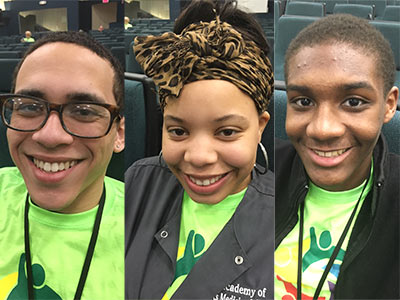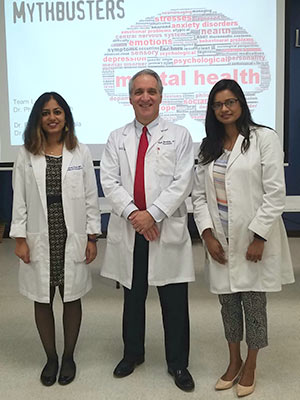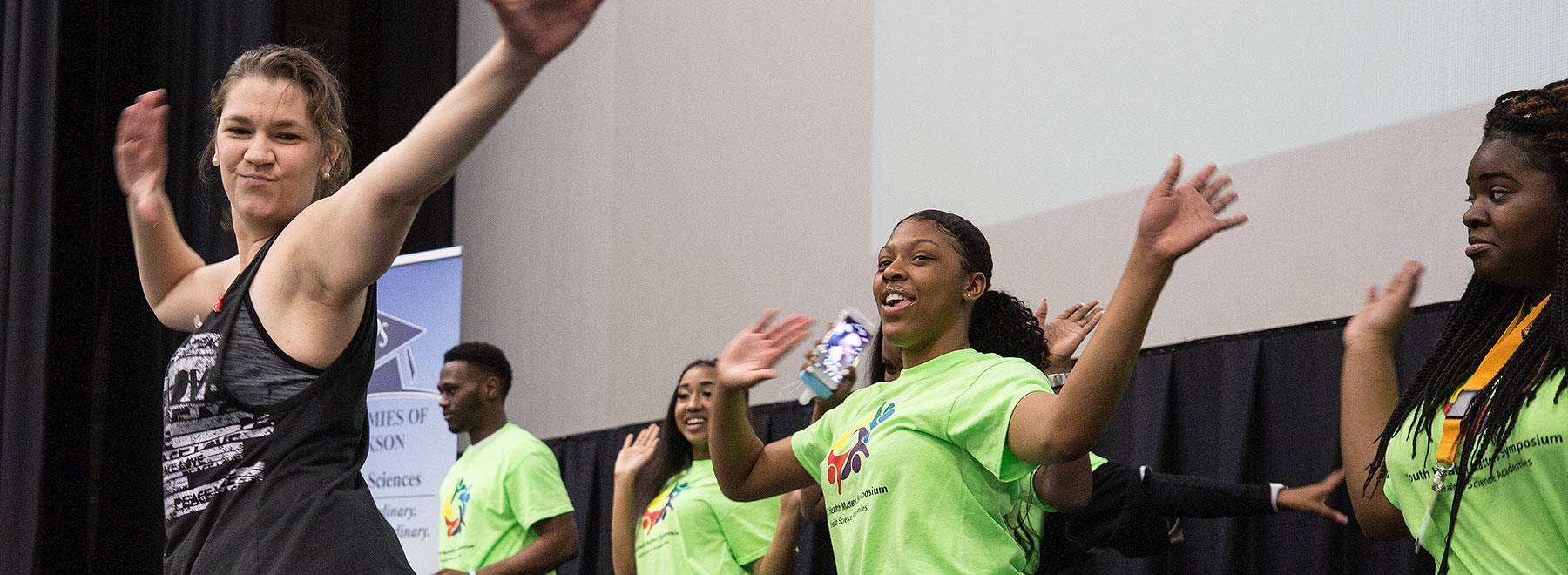Symposium empowers teens to live healthy lives
For Vleary Washington, it’s managing her asthma, a life-threatening illness the 18-year-old has coped with since she was 12.
For Eddie Cole, it’s maintaining the right weight for his lanky, 5-foot, 10-inch frame by monitoring his fat-to-muscle ratio.
And for Zack Wallace, it’s trying to take part in a steady mix of exercise that will help him reach his potential as a basketball player while maintaining a healthy physique.

The three Murrah High teens joined several hundred of their Jackson Public School District peers Wednesday on a quest to learn more about the top health issues facing high schoolers in the state. They attended the Youth Health Matters Symposium, a morning packed with workshops and speakers hosted at the Jackson Medical Mall by groups including the United Way of the Capital Area, the school district and the Academies of Jackson, a consortium of the Jackson district’s seven high schools.
Students, parents and teachers packed the Thad Cochran Conference Center as they chose between seven workshops and checked out tables set up by schools and government agencies including the University of Mississippi Medical Center’s Center for Telehealth, School of Nursing and School of Health Related Professions.
The goals: give teens the knowledge they need to be healthy and build healthy habits, to inspire them to consider careers in health and the health sciences, and to master strategies to promote healthy habits that they can share with friends and family.
“They are a unique population in health care,” said Dr. Kate Fouquier, associate professor of nursing and director of Lanier High’s in-house teen health clinic. “They’re too old for pediatric care, but too young to navigate adult care. Finding that youth-friendly sweet spot for them is important.”
She led “Health Care: Did You Know?” The workshop gave teens valuable information on what care they’re entitled to, and laws that protect confidentiality of their personal health information.
“Our adolescents are at incredible risk,” Fouquier said. “It’s so important that we open up the health care dialogue. When we look at HIV rates in the state of Mississippi … It’s killing our kids, and they don’t know about it.”

Washington, Cole and Wallace are frank about not just their own health challenges, but what issues they and their friends face every day – especially those that carry stigmas or shame.
“A big thing for our age group is STDs, but nobody wants to talk about it,” said Cole, a junior. “We don’t have sex ed classes. The reality is that one in five adults have some type STD. We need to be more aware at a younger age, and that will shape us as we grow up.”
Many of their friends don’t take STDs seriously, said Washington, a senior. “It’s not something you play around with. It’s not a joke,” she said. “People can die from this.”
Wallace is a sophomore. “Most of the time, people don’t think about it until it’s too late,” he said of STDs. “They’re just worried about sex.”
Presented by medical professionals and leaders of nonprofits devoted to health, the sessions ran the gamut from health literacy and well-being to making wise choices in a teen culture dominated by alcohol and drugs, to recognizing mental illness in themselves and their peers.

If your friends say they’re depressed, don’t write them off as crazy or dramatic, physicians in the UMMC adult psychiatry residency program told a large group of high-schoolers in a workshop dubbed “Mythbusters: The Facts of Mental Health.”
“Telling someone struggling with depression to cheer up is like telling someone with diabetes to just lower their blood sugar,” said Dr. Prathyusha Vangala. “That adds layers of shame. No amount of willpower is going to fix that. You need to ask for help.”
If someone tells you depression is just part of growing up, don’t believe it, said Dr. Afifa Adiba, also a psychiatry resident. One in five teens ages 13-18 will develop a mental illness, and less than 20 percent get treated because of the stigma attached to mental health treatment, Adiba said.
She explained the difference between bipolar and schizophrenia, two mental disorders that can be debilitating and life-threatening unless treated by medication. And when she asked the group if it’s true that teen suicide is a big problem, the answer was a resounding yes.
“You know why it’s called the silent epidemic? Because no one wants to talk about it,” Adiba said. “If someone comes to you, pay attention to them.”

Jim Hill High teacher Teresa Rader got the teens’ attention when she shared with them the story of her grown son, who successfully takes medication for a mental disorder characterized by both schizophrenia and bipolar disease. “He was 12 years old, and woke up one day and was different,” she said. “He said, Mama, something’s wrong. I don’t feel right.’ The next morning, he thought the TV was talking to him.”
She took him to a hospital, where he was diagnosed and placed on medication. “The doctor said that if I hadn’t taken him in so early, he could have died,” Rader said. “If you have a friend or relative who is not acting right, you have to tell someone. It’s like any other disease. He has to take his medication.”
It’s that type information that today’s teens need to empower themselves to be mentally, physically and emotionally healthy, conference organizers say.
“In order for them to be healthy, they must have a healthy body, but also a healthy mind,” said Nikki McCelleis, director of educational initiatives for the United Way of the Capital Area. “It’s important for them to pay attention to health signs and to get attention for issues that they may be dealing with medically.
“We want to give them information on being a well-rounded, healthy person,” McCelleis said. “We want them to take resources back and share them with their families and parents, and to be advocates in their communities in regard to good health.”


